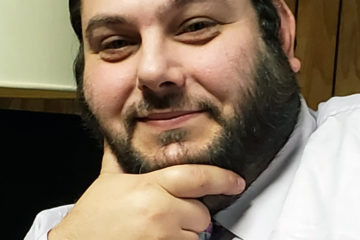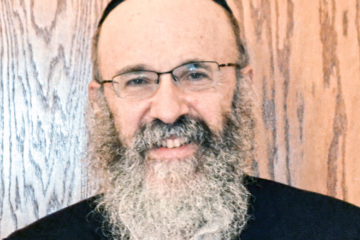‘Few are guilty, but all are responsible’
By Rabbi David Burstein, Temple Beth Or, Washington Township, Ohio
Special To The Dayton Jewish Observer

Philosopher Edmund Burke is believed to have said, “The only thing necessary for the triumph of evil is for good men to do nothing.”
As the weeks pass, the sordid tale of accused child molester and former Penn State football coach Jerry Sandusky unfolds, with each turn making me angrier and angrier.
As of this writing, his lawyers have stated that he was teaching his child victims lessons on “hygiene” in the showers at Penn State University.
The absolute absurdity of this statement belittles the truth of what has happened: the victimization of at least 10 young men over many years by a man in power.
Although the response by the majority in our country has been both outrage about and support of the victims, we also must examine the role of the witnesses and the university complicity in their actions either by not physically intervening or holding Sandusky accountable by reporting his crimes to the proper authorities.
“Few are guilty, but all are responsible” is the way Abraham Joshua Heschel formulated a Jewish response to evil.
Heschel distinguished between guilt, a term that applies specifically to the perpetrators of crime and sin; and responsibility, “the capability of being called upon to answer, or to make amends, to someone for something, without necessarily being directly connected with or involved in a criminal act.”
In the immediate aftermath of the charges against Sandusky, the accusations led to the question of the role of both the bystanders and the possible cover-up by an administration and head football coach, Joe Paterno.
Columnist David Perez commented at the time of the accusations, “Joe Paterno’s legacy is not even in tatters. It is immaterial. It doesn’t matter. By staying silent to guard his legacy, he and the Penn State administration obliterated all the genuine goodwill his tenure in charge of the football program generated for the institution and the man. One could question whether football matters at all, but that’s not even a worthy question of the matter at hand. This is about children who were victimized twice: first by a rapist, and then by a culture of silence borne from a pathetically misguided set of priorities. One can only speculate whether Paterno and the administrators in question were in denial that Sandusky was capable of something so heinous, or if they were more cynically attempting to guard their respective legacies and the institution by not saying anything. It doesn’t matter, and the most that can be salvaged from this is that some semblance of justice — though it obviously will never be proportional — can be served.
“What happened in Happy Valley is an extreme example of what can go wrong in a culture of silence. Yet we as a society are delusional if we think that this closed-shop mentality can’t create similar monstrosities: they have, and likely will continue to do so because we are frail and self-interest is both overwhelmingly attractive and easy to misjudge.”
The story broke and then others followed. That is the frightening truth about childhood sexual abuse. It is more prevalent than we can imagine.
Although rates are likely to underestimate the actual number of sexual abuse cases of boys, according to the Journal of the American Medical Association, approximately one in six boys is sexually abused before age 16.2.
More than 20 million men in the U.S. alone struggle with the pain of having been abused, each suffering effects such as depression, substance abuse, difficulty maintaining healthy relationships, and suicidal thoughts.
The aftereffects of sexual abuse permeate virtually every aspect of our society and impact the lives not only of the victims themselves but also their spouses, friends, co-workers, and the community itself.
The chances are that you know someone like those boys from Penn State.
They are your fathers, your husbands, your brothers, your sons. They are your teammates, your colleagues, your friends.
You come in contact with them everyday. They serve you your food, change your oil, teach your children, and live in your neighborhoods.
Some carry their secret for many years for many reasons. Some are scared you won’t believe them having been threatened and convinced by their abusers that this would be the outcome of exposing the truth.
Some are frightened you will look at them differently.Although the statistical studies of abuse state that more than 80 percent of sexually abused boys never become adult predators, they are afraid you will be afraid of them.
So what can we do to both support the victims and their families?
In the Torah, God commands us to both shamor (to guard) and zachor (to remember) the Sabbath. To guard and to remember.
We can learn from this how to best respond to those affected by the Jerry Sanduskys of the world.
Shamor: we can protect our children and others by providing open channels of conversation, by providing space for a child to be believed and safe.
Secrecy and threats of not being believed are tools pedophiles use to control their victims. Listen to these children and their families.
Shamor: we can protect by supporting both intrinsically and extrinsically organizations that help victims of child sexual abuse and their families.
We can serve on their boards, make sure their employees are compensated, donate money and/or our time.
And zachor – to remember. We as a society need to understand that this can happen, that this does happen, all the time.
We all need to maintain a sense of vigilance and collective memory to help stop abuse.
The reasons that men such as Jerry Sandusky are able to continue is because their crimes are so overwhelming we often turn our heads in shock.
We need to remember this story and the others that have followed and say, “never again.”
My prayer is that Jerry Sandusky will be sent to jail and will never abuse another child.
I pray that the children who have been hurt by him will get the help they need and are deserving of.
And I pray that you and I will actively work to guard those who are vulnerable, to remember those who have been wounded, and to actively pursue justice.




